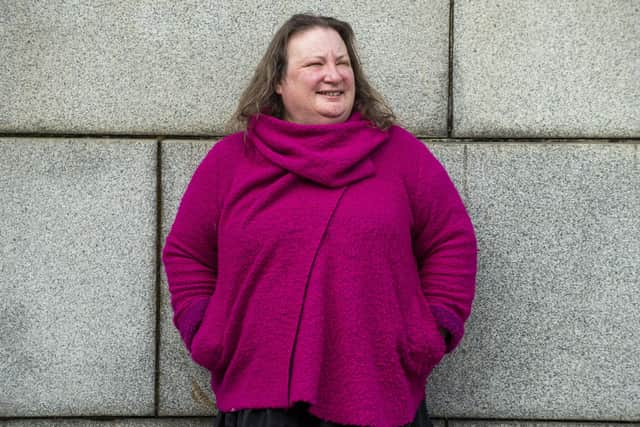Great niece of SNP founder reveals she chalked women's rights message at government HQ
In large capital letters, she quickly scrawled “Women’s rights are not a hate crime” followed by a social media hashtag message “Women are watching” – then walked away.
Not quickly enough though, she recalls. A security guard from the government building chased after her, demanding a name and address, to which she gave a false answer to the first, and the genuine answer to the latter.
Advertisement
Hide AdAdvertisement
Hide AdAs a result, on the evening of Wednesday, February 24, two uniformed police officers appeared at the 52-year-old’s door, asking questions about her chalk protest and, she says, suggesting that any future similar behaviour could result in a charge of breach of the peace.


"It was a spur of the moment thing,” she says. “Similar words had been written a few weeks before but had been washed off, and I just thought ‘I’ll write them again’. It was impromptu but I felt it important to do something to try and make sure the government got the message that so many women were worried about the Hate Crime Bill – and we still are.
"I did it because I feel women’s rights are being eroded as is our ability to talk freely and openly about issues which affect us, without being accused being hateful or transphobic. To write those words in front of the building where these policies are being developed, which are having this chilling impact on women… it felt it was the right thing to do.
"The security guy came chasing after me, yelling about having to pay for cleaning it off, which was ridiculous as it was just chalk. I didn’t think much more about it until the police turned up.”


Gordon, who is the great-niece of a founder of the SNP Mary Dott, says she is concerned about the legislation which was passed by Holyrood earlier this month, and its “chilling effect” on women’s rights campaigning and free speech. She feels that the police arriving to question her is proof that her fears are correct.
"I didn’t use spray paint, I didn’t shout and scream while I was doing it, I wasn’t breaching anyone’s peace,” she says. “It was chalk, easily removable, yet here were two male police officers at my house warning me off.
"I did feel intimidated. They were demanding to know where I worked, talked about Section 38 [of the Criminal Justice Act] which is breach of the peace, and were asking if I was involved in a conspiracy. They didn’t give me their names.
“I don’t have children or a job, though I have caring responsibilities, so I feel I have nothing to lose in speaking out and I worry that women will be put off getting involved in political activism.”
Advertisement
Hide AdAdvertisement
Hide AdThe Hate Crime Bill provoked controversy on its passage through the parliament to become law, with a variety of organisations concerned about its impact on freedom of expression. Amendments were made by Justice Secretary Humza Yousaf to increase the thresholds by which a hate crime could be considered to have been committed, including the introduction of a “reasonable person test”.
However, despite a recommendation by Lord Bracadale – who had reviewed all Scottish hate crime laws and recommended consolidation in the new Bill – that sex should be added to the list of protected characteristics along with race, religion, sexual orientation, age, disability and transgender identity, Mr Yousaf rejected the idea.
While some women’s organisations believe that adding sex to the Bill would not benefit women, other women’s groups have lobbied for it to be there to assure women their fears were taken seriously by the government. A last-ditch bid to have a sex aggravator added to the Bill by Scottish Labour’s Johann Lamont was defeated.
Now a working group, chaired by Baroness Helena Kennedy, will investigate if a stand-alone offence of misogyny should be introduced, although Mr Yousaf has pledged to add sex to the Hate Crime Bill, should her group recommend it.
“My great-aunt Mary would most certainly not be going along with this SNP policy,” says Gordon.
"My parents were involved in anti-government protests in South Africa too and I’ve been brought up to believe that if something’s wrong you should do something about it. Make your voice heard, your views known.
"So many women are having to stay quiet through fear of losing work or being sanctioned in some way when they talk about the impact on women’s rights of changes to trans rights. Women are afraid.
"I have friends in the Scottish Government who are scared to give money to crowdfunders raising money for women’s organisations who believe sex matters, rather than gender identity, in case they can somehow be traced.
Advertisement
Hide AdAdvertisement
Hide Ad"Now the Hate Crime Bill is through I do believe it will be used by some seeking to criminalise women for raising their concerns.”
As a government building, security around St Andrew’s House, is understood to be particularly tight. Nicola Sturgeon’s official residence, Bute House in Charlotte Square, as well as a number of SNP MSPs offices have also been targeted by women’s rights activists who have left suffragette-colour ribbons, stickers and notes saying "defending women's wrights is not a hate crime”.
A spokesperson for Police Scotland said: “On Wednesday 24 February 2021, officers were alerted to possible vandalism taking place on Regent Road.
“Following some enquiries, a 52-year-old woman was traced and advice was given, no criminality was established.”